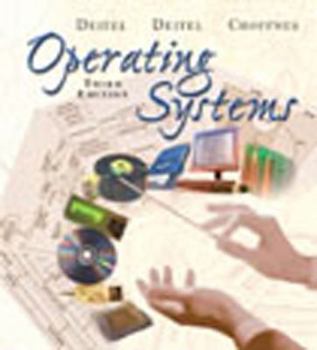Computer Systems Architecture: A Networking Approach
Select Format
Select Condition 
Book Overview
The third edition of Operating Systems has been entirely updated to reflect current core operating system concepts and design considerations. To complement the discussion of operating system concepts,... This description may be from another edition of this product.
Format:Paperback
Language:English
ISBN:0131246968
ISBN13:9780131246966
Release Date:January 1
Publisher:Pearson
Length:2 Pages
Customer Reviews
5 ratings
Nice product
Published by Thriftbooks.com User , 16 years ago
I am happy that i bought it. It's a paperback version of third edition. Saved a lots of money
An excellent text in operating systems, there is more than you need for a semester course
Published by Thriftbooks.com User , 17 years ago
In my career, I have taught mathematics and computer science at the college level, developed and delivered courses in corporate training, taught classes in community education and occasionally engage in private tutoring. In the rapidly changing field of computer science, if you do not study, study and study, it will not take long before you are no longer on the cutting edge. While the continued existence of programming languages such as COBOL and other legacy systems does provide employment, they are not circumstances one should rely on for a long-term livelihood. Therefore, I am always trolling for new and better material for use as textbooks or for self-study. Having taught a CS major course in operating systems several times in the last decade, I have a natural interest in this book. I found it to be very detailed and complete, while most students will probably skip the historical notes, they do provide excellent reference points concerning the development of operating systems. I would use some of them as starting points for in-class discussions of how some of the critical problems in operating systems development were solved. A few self-review questions with answers appear at the end of each section. The following items are included at the end of each chapter: *) A list of web resources *) A summary of the chapters *) A list of the key terms *) An extensive set of exercises (no solutions provided) *) A list of suggested programming projects *) A list of suggested simulations *) An extensive set of references As befits the trends in computing, a great deal of time is spent on multiprocessing and distributed environments. Coded solutions to many of these problems are explained and Java is the language used to simulate the solutions. The last two chapters are case studies of the Linux and Windows XP operating systems. At this time I am not teaching operating systems and do not know when I will teach it again. When I teach a class again after some time away from it, I generally make a list of my top three candidates for the text and select the one I consider the best. At this time, this book would be on that list of three.
Very good introduction to operating systems
Published by Thriftbooks.com User , 19 years ago
If you are a fan of the other Deitel books, you will probably like this one as well. I used this book in an undergraduate operating systems course and found it to be very useful. I later used the "dinosaurs" book (Silberschatz et al.) in a graduate course and was quite disappointed by the lack of detail. One minor complaint is that this book is quite verbose, so one tends to get a little tired reading it. On the other hand, all of the details are what make this book a very good introductory text. My complaint about the "dinosaur" book is the lack of details and lack of verbosity. In defense of the use of Java that other reviewers have complained about, I'm guessing that the writers wanted to use a language that their target audience (college undergrads) would most likely be familiar with. Also, using threads in Java is much easier than in some "OS-friendly" language like 'C'. As a way of demonstrating concepts, Java works quite well.
Complete book
Published by Thriftbooks.com User , 20 years ago
I personaly love this book. Its on my must have list. Its very up to date (3/E includes detailed case studies on Windows XP and Linux) and the information is presented in an easy to understand method. The pictures are orginized nicely in a way that they help with the concepts instead of just taking up space. As a computer engineering student Ive had many textbooks on subjects like this and this is by far one of if not the best in the subject matter. I definatly recomend this book.
The best of learning operating systems theory
Published by Thriftbooks.com User , 23 years ago
If your not an expert in computer science, or even if you are just a beginner, you'll find this book quite useful no matter the operating system you work with. This is also an entertaining book, since it can be read from the beginning to the end the same way you could do it with an exciting novel.Concepts are explained very clearly and, if you'd like to go deeper in any topic, there's an extensive bibliography for every chapter. The document's structure is the same along the book, beginning with introductory text, an ending with a summary of concepts.Don't be afraid if you're not a brilliant hacker. This book explains everything in such a friendly way, that it makes operating systems theory appear easier than other operating systems books do. Everybody can learn from it!





